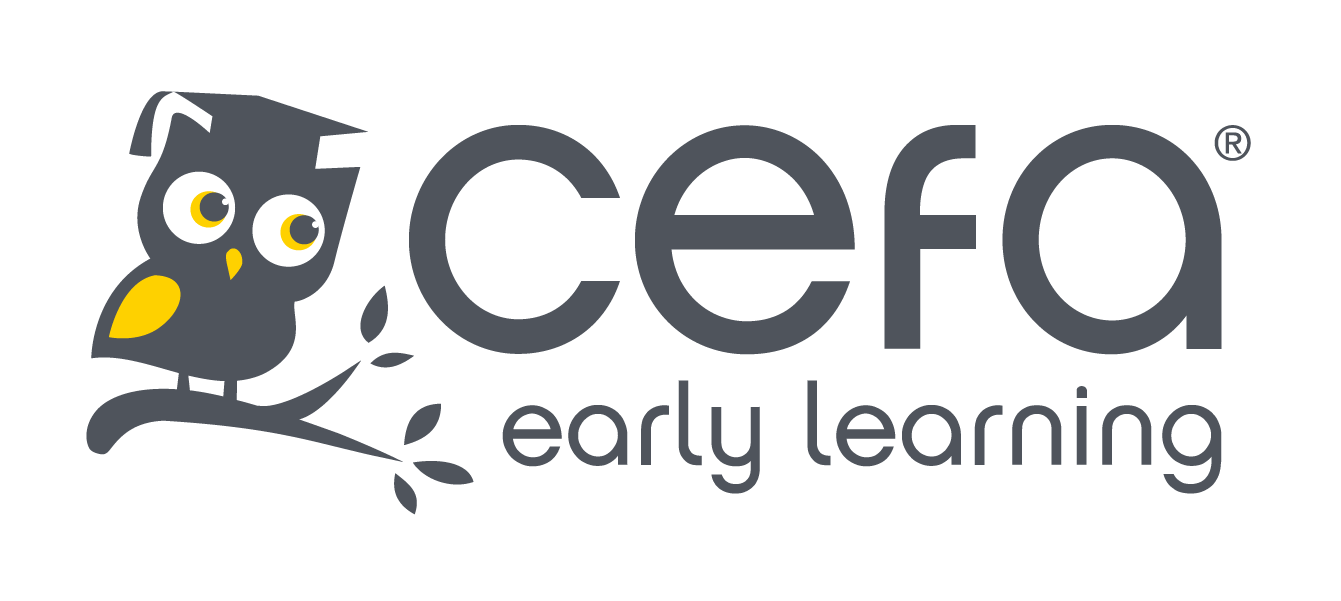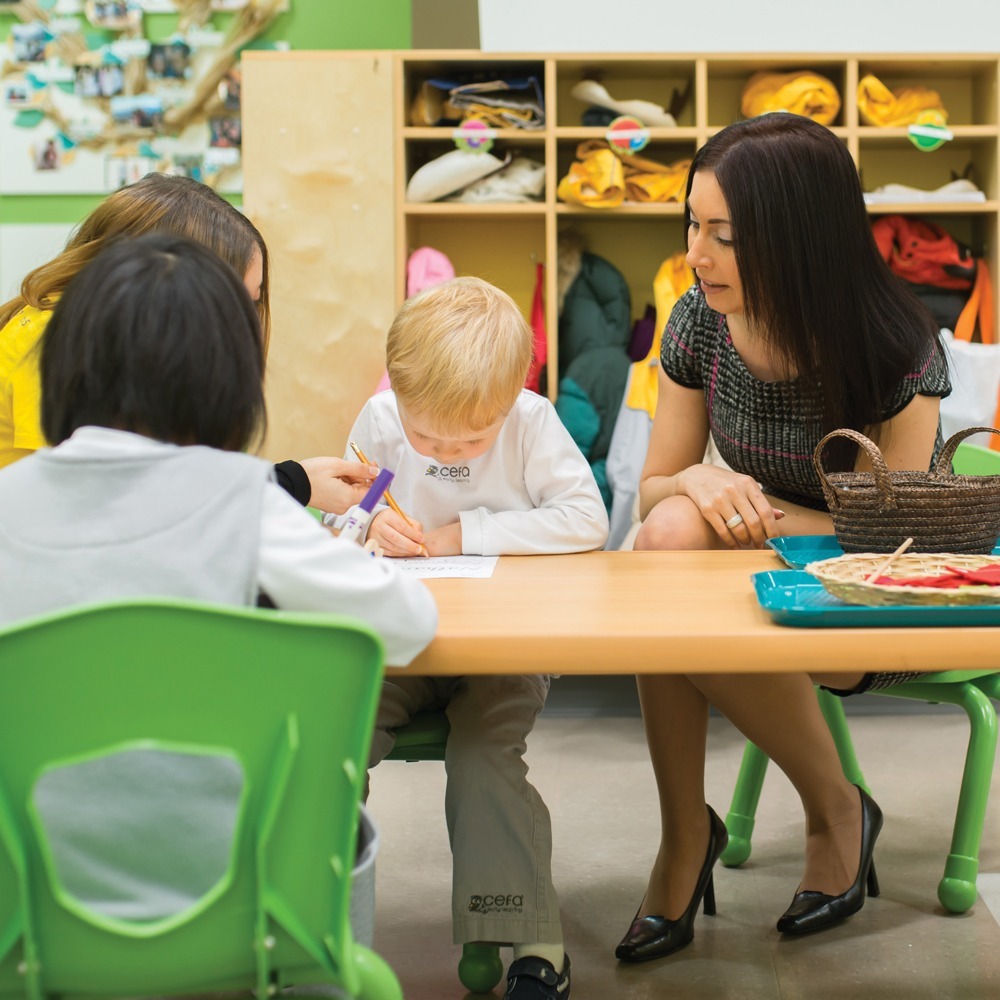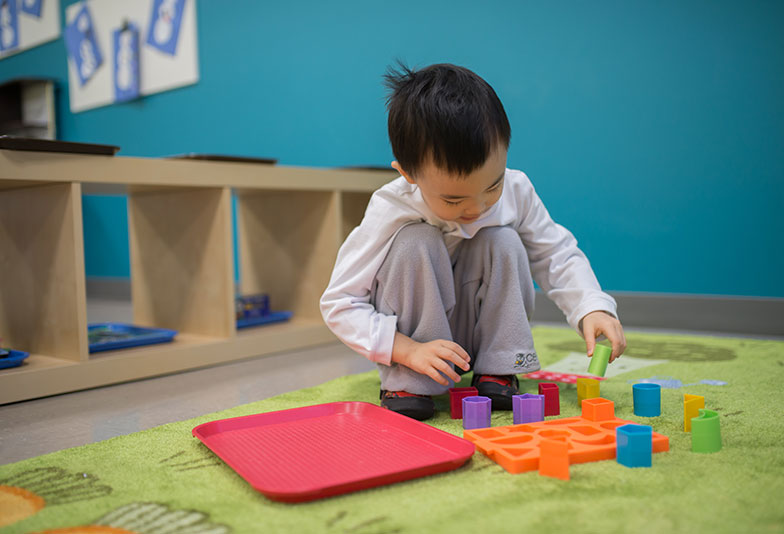
CEFA proprietary curriculum is sophisticated and world‑class.
Through the CEFA proprietary curriculum, we offer an incredible opportunity for children to explore, learn and contribute to the world. CEFA students develop and play well with other children who are the same age, and they are always learning and playing—not just learning, and not just playing. Academics matter. At CEFA, core fundamental skills are at the heart of our proprietary curriculum, which is constantly advancing based on the latest studies and neuroscience.

Click on the back of a Curriculum card below to learn more about the courses offered within each pillar.
Challenges of Tomorrow
S.T.E.M.
Technology
Engineering
Math
Coding
A Foundation for Success
Literacy
Writing
Math Language
Second Language
Fine Arts
Music
Creative Play
Drama
Visual Arts
Make a Difference
Mindfulness
Contribution
Culture Immersion
Yoga
Outdoor & Nature Program
Preparing Your Child for the Challenges of Tomorrow
Sensitive period of brain development: Numbers
Critical thinking and problem-solving are among the most important and essential skills students can learn today. As adults, critical thinking and problem-solving are cardinal tools that help us navigate relationships, employment, media, politics, and more. When children engage in STEM activities (Science, Technology, Engineering, and Math) in the early years, critical thinking and problem-solving are encouraged and fostered at a time when the foundations for this part of the brain are being developed. A solid foundation in critical thinking and problem-solving between the ages of 1–5 allows for more creative problem-solving and sophisticated critical thinking in the future.
Giving Your Child A Foundation for Success
Sensitive period of brain development: Language
Children crave knowledge. Literacy is a gateway to advanced learning. Every academic discipline (including math) has a foundation in literacy. Research shows that a good grasp of literacy at an early age is excellent for brain development and lifelong academic success.
Children who are routinely read to and immersed in reading and writing activities thrive. If a child has limited access to language and literacy experiences in the home, quality early learning in childcare, preschool, or cross-age literacy programs can have a significant and positive impact.
In 2008, the National Institute of Literacy issued a report, “Developing Early Literacy: Report of the National Early Literacy Panel.” Among its many findings, the report stated that “the foundational reading and writing skills that develop from birth to age five have a clear and consistently strong relationship with later conventional literacy skills.”
Source: Early Literacy | Family and Community Engagement Research Compendium
Our program provides students with the tools to build upon their vocabulary and literacy skills. Teachers follow the progress of each child, and each year, parents are invited to learn the CEFA letter-by-letter method: A simple, playful and effective way to teach your child to read at home.
It introduces students to essential pre-writing and fine motor exercises that train hand muscles to write, develops hand-eye coordination, and familiarizes children with lines, curves, letters and words. Writing is introduced every day with a combination of fine motor, games and activities, sensory experiences, drawing, and one-to-one writing.
Children are often introduced to abstract mathematical language prematurely. As a result, many children struggle to grasp their meaning. Early math is as important as early reading. Children must learn the concepts behind math symbols, and we need to be very deliberate in the language we use to teach math concepts in the early years. In essence, children must understand how to read and speak math before they can engage in math.
Children have super curious brains. They want to learn more, and our Math Language program provides children with an essential foundation and bridge for continued learning.
Developing Your Child’s Creativity and Skill of Creative Thinking
Sensitive period of brain development: Emotional Control, Emotional Intelligence & Peer Social Skills
Children develop self-regulation through their relationships. Emotional control and self-regulation start at birth, and key brain development in this area peaks between ages 0-3. Children are always watching and learning from adults, peers, and the community around them.
A child’s emotional state and ability to regulate and control their emotions is a key factor in the health of their relationships, home life, mental health, academic performance, and ability to thrive. Studies have shown that stress and anxiety negatively affect child brain development and endanger children’s ability to learn.
Communication is often a source of frustration and stress in the early years as children are still developing language and listening skills. Creative activities like dance, music, creative play, drama, and visual arts, are not only stimulating and fun but therapeutic platforms of communication and expression. Children who engage in creative arts learn to utilize multiple platforms, aside from language, to communicate their feelings, intentions, hopes, joys, and frustrations to their peers and adults. Children also learn to interpret the emotions of their peers and develop emotional intelligence through these same platforms.
At CEFA, Dance is an important part of our curriculum because we teach the whole child, and this is a great opportunity for children to express themselves from the inside out.
The CEFA music curriculum proudly incorporates the award-winning program Fun with Composers Series. Through the integration of children’s literature, storytelling, drama, creative movement, song and instrumental play, classical music is taken from its sophisticated, mysterious realm to one that is completely child-centred.
By choosing how to play, who to play with, and what to play, children further develop their creativity. At the same time, unstructured play gives children the opportunity to engage with others, and learn how to socialize in the process.
An important part of CEFA Creators, Drama helps build confidence, drives creativity, helps children develop empathy, and increases a child’s ability to concentrate. By taking on different roles, children are taught different behaviours and even perspectives.
The process of exploring and nurturing creativity helps to provide a new language and another avenue for children to express themselves. Art experiences are presented daily in the classroom, with CEFA trained art teachers working with children on a weekly basis.
Teaching Your Child to Make a Difference
Sensitive period of brain development: Peer Social Skills
Children are capable and competent. Children can make a difference. It is sometimes easy as adults to discount a child’s abilities. It is also important to understand that children are constantly developing their own identities based on the environment around them.
Children are always listening and always watching and always learning. When children are shown respect, they learn that they are deserving of respect.
When children are shown that they are capable and competent, they internalize these understandings and afford this recognition to other children. When children learn how connected our communities are, it also helps them to understand the dynamics of their own role in their communities.
The Change-Makers component of the CEFA curriculum is about learning how to contribute with an astute understanding of community and a deep foundation of respect. Activities are rooted in empowering exercises and activities in collaboration, recognition, community, and the environment around them.
We all work together to give children a sense of belonging and the power to make things different.
Children who are taught to find their voice, ultimately learn that they can make a difference.
Children are also inspired to be empathetic, responsible, and highly collaborative.
These crucial skills have been shown to effectively increase self-control, self-confidence, self-respect, positive communication and listening skills. Children learn to appreciate themselves and their peers, and show increased empathy and compassion for others. Children also learn to self sooth, relax on demand, and to have an outlet in times of physical and psychological stress.
Yoga is also excellent exercise for young children.
Hands-on learning and natural environments stimulate children's senses through what they hear, touch, see and feel. Outdoor play with other children helps them gain social skills by interacting, collaborating, and negotiating with others.

Discover more tools for Early Learning Education!
At CEFA, your child will be provided with the freedom to learn and grow through play with our proprietary curriculum, which also serves to prepare them for kindergarten, and for life.
CEFA Founder & Early Learning Expert, Natacha Beim, designed CEFA for children to explore and learn and discover how they can contribute to the world.
The CEFA approach to learning is informed by science-based studies on Early Learning principles and is constantly advancing. We diligently stay on top of the latest news and research in the field of Early Childhood Education and Early Learning. We also endeavour to share quality articles written by our experts and featured in our Blog and CEFA Magazine.
